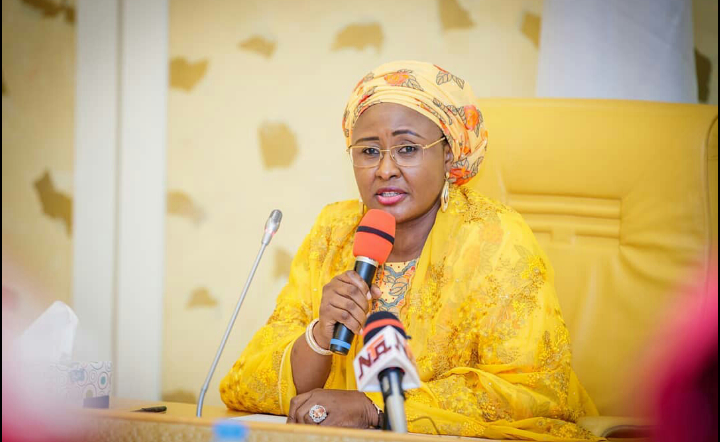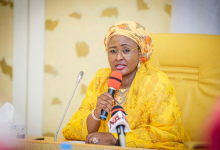Aisha Buhari: Many Wrongs Don’t Make A Right

On Friday, news reports indicated that President Muhammadu Buhari’s wife and Nigeria’s First Lady, Aisha Buhari, had withdrawn from an Abuja Federal High Court, a case of alleged defamation against a citizen, Aminu Mohammed Adamu, a final year student of the Federal University, Dutse, Jigawa State.
This hopefully brings to a close, a case that has animated mainstream and social media for weeks, pitched millions of Nigerians against the president’s family and threatened to throw Nigeria into an unnecessary turmoil of the kind witnessed in October 2020. But lessons must be learned.
Sometimes in May or June this year, as alleged, Adamu had posted a statement and an accompanying picture on Twitter, which the First Lady apparently found offensive. But then, Adamu was arrested mid last month after a team of plain clothes detectives had tracked him down, allegedly on the orders of the First Lady.
Reports had it that he was subjected to beatings and torture by the police and others and denied access to his family for days before being charged to court for an alleged defamation.
No doubt, Adamu’s comments about the First Lady are misguided, ill-mannered and reprehensible. At age 24 and in the university, we would expect Mr Adamu to recognise that a bare minimum of respect for the dignity of the human person is required in public discourse, even for the criticism aimed at public officials or those associated with them by marriage or birth. And more importantly, as a son and a young man, we would expect him to speak respectably of women in general, and more so, about the wife of any Nigerian president who, by her position, is the mother of the nation, in the same way her husband is the father of the nation.
That Adamu failed in this basic expectation of a young member of the society is a sad commentary on him, for which his family would be much disappointed. We hope he and other young Nigerians would learn from his experience.
Criticism is free, but in that freedom also comes much responsibility, at least for basic decency in the use of language and choice of words, something this social media generation must learn as they grow into adulthood and full citizenship.
That said, however, the First Lady must also learn some stark lessons from this needless episode. First of all, the reported abduction and detention, and rumoured torture of Adamu are also reprehensible in themselves and stand rightly condemned too.
We are a country governed by laws, and however offensive Adamu’s tweet might have felt, the right and proper thing to do is to seek the protection of the law through the courts, not to become the law by oneself. Illegal abduction, detention and torture of a citizen are offences themselves to which redress may be sought in court, even where, as alleged in this case, they are carried out by the police on the orders of a person as high and mighty as the First Lady.
This is why in the debate that has followed, while many Nigerians felt Adamu’s post was evidently wrong, many still felt the need to point out that his reported abduction and detention in Abuja, a place far away from his home, were even worse wrongs against his rights as a Nigerian citizen under our laws. It is rather unfortunate that even after similar cases in the past, men and women of power in Nigeria have simply refused to learn that they too are not above the law and cannot be. The police too must learn that as long as they are too quick to do the biddings of the powerful, however, unlawful, then they would scarcely ever earn the respect and appreciation they deserve from Nigerians.
More broadly, it is time First Ladies, and any future First Gentleman in Nigeria, recognised that their position is ascribed merely by marriage, not earned through election or official appointment. As a result, their authority is moral and symbolic, not legal. Therefore, a First Lady has no right under our democratic system to order the arrest and detention of any citizen, however aggrieved they may have felt by a citizen’s statements towards them on social media or not.
Indeed, the authority of a First Lady derives from the kindness and love they show the country and in the extent of patience and dignity they demonstrate, even at a moment of unjustified personal attack such as this.
We hope then, that the hidden lesson here – that power and authority are most effective when used sparingly or modestly- has also been learned.
Had the First Lady taken the course of least but most effective reaction through a stern warning to Adamu’s parents or teachers for example, this whole sad episode would have passed without much notice. And the torrents of condemnation and outrage directed at the First Family over the past few weeks, not to talk of the threats of planned protests by students that could easily have plunged the country and the government into a needless crisis, would all have been avoided.
Finally, this case again demonstrates the need for regulating conduct on the social media in Nigeria. Such laws abound in many countries, some monitored and enforced by the social media companies themselves, others by a country’s law enforcement authorities.
We urge the federal and state governments to sit with other political parties, civil society organisations, the media and all other stakeholders to fashion out a framework for regulating conduct on the social media in ways that do not abridge Nigerians’ rights to free speech. All rights have their limits.












